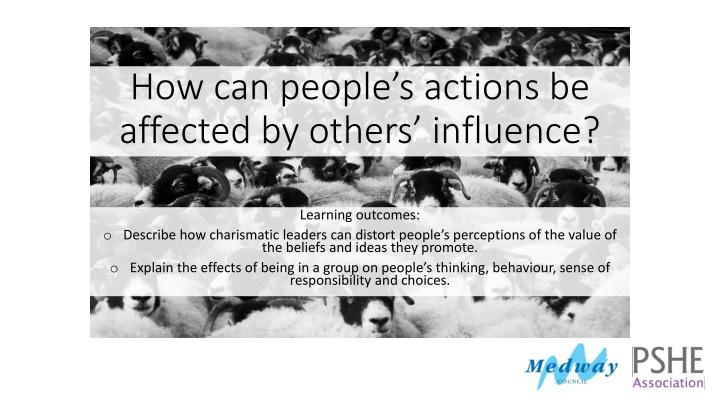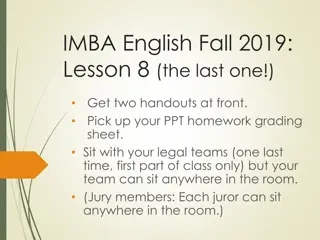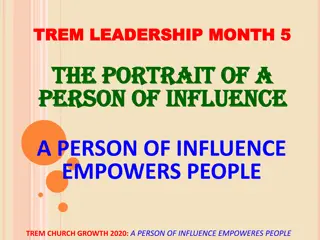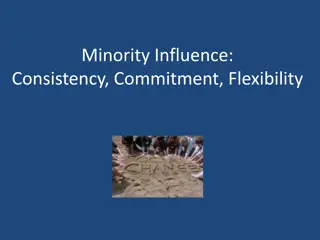
Influence of Charismatic Speakers on People's Actions
Explore how people's actions can be influenced by charismatic leaders and the impact of group dynamics on decision-making. Learn about charismatic speakers, their characteristics, and the effects of charisma on perception and decision-making. Dive into scenarios illustrating how influence can shape behaviors and choices in social settings.
Download Presentation

Please find below an Image/Link to download the presentation.
The content on the website is provided AS IS for your information and personal use only. It may not be sold, licensed, or shared on other websites without obtaining consent from the author. If you encounter any issues during the download, it is possible that the publisher has removed the file from their server.
You are allowed to download the files provided on this website for personal or commercial use, subject to the condition that they are used lawfully. All files are the property of their respective owners.
The content on the website is provided AS IS for your information and personal use only. It may not be sold, licensed, or shared on other websites without obtaining consent from the author.
E N D
Presentation Transcript
How can peoples actions be affected by others influence? Learning outcomes: o Describe how charismatic leaders can distort people s perceptions of the value of the beliefs and ideas they promote. o Explain the effects of being in a group on people s thinking, behaviour, sense of responsibility and choices.
Charismatic speaker What is a charismatic speaker? Can the class think of some examples of charismatic speakers? Webster defines charisma as a personal quality that gives an individual influence or authority over large numbers of people . A charismatic speaker leaves an impression on their audience that makes them want to come back for more.
What makes a charismatic speaker? In groups, note down the characteristics of a charismatic speaker and those of an informed speaker. NB Speakers can be both charismatic and informed so it is fine to have characteristics in both columns. Charismatic speaker Informed speaker Interesting to listen to Quote research
Examples of charismatic speakers Martin Luther King s I have a dream speech: https://www.youtube.com/watch?v=3vDWWy4CMhE An analysis of one of Obama s speeches which contributed to his rise to the presidency: https://www.youtube.com/watch?v=OFPwDe22CoY. Add any additional ideas to your group s lists. How do people feel when they hear a charismatic speaker? Do you think how things are said can sometimes feel more convincing than what is being said?
If we enjoy listening to someone, does this mean what they are saying is accurate or factual? Wayne Rooney s endorsement of a Nike football: https://www.brandwatch.com/2013/10/celebrity-twitter- endorsements-regulations-allegations-and-selling-out/ Katy Perry s Popchips advert: http://www.brandingmagazine.com/wp- content/uploads/2012/08/katy-perry-popchips-1.png If someone we respect or find charismatic says something, how does that impact on our viewpoints? Apply your checklist of questions from Lesson 2 for evaluating information to one of the examples above.
Scenario 1 Geoffrey is a lead character in his group of friends. He has an older brother who is able to get him into parties with older friends and gets him beers when Geoffrey gives him some money. This has given him a reputation as a party animal, which seems to have gained him popularity. The only thing is that many of the people Geoffrey thinks are friends are actually quite scared of him. At lunchtime, Geoffrey suggests they go to a party where he thinks there will be loads of drugs they could share, as he has seen lots of posts about the party online. JT isn t sure he wants to be involved. Shanai s mother had a substance problem when she was younger and so she is firmly against people using, but she doesn t know how to stand up to Geoffrey on this as he sometimes gets aggressive and threatens to leave people out of the group if they are no fun . What should JT and Shanai do?
Scenario 2 Tammy is an inspirational speaker. She believes in rights for all minorities and feels the government are not doing enough to support people with disabilities. James has been going to her meetings at the local youth centre for a long time now and he has chatted to her a fair bit. At the most recent meeting, Tammy encouraged the crowd to go with her into town that night to paint graffiti on the walls to grab people s attention to the inequalities people with disabilities can face. She says that anyone who doesn t do this is letting down society and is to blame for the ongoing discrimination. Tammy wants to know if James is going to go. He knows that spraying graffiti is against the law, but agrees that inequality should be stopped and really likes Tammy. What should James do?
Strongly agree Strongly disagree Statement 1: It is hard to be the first member of a group to question a decision or opinion. Statement 2: People always break rules if others break them too. Statement 3: Being in a group makes people act differently.
Group thinking One rainy afternoon a group of friends are sitting around talking. One of them, Sue, suggests they take a trip into a nearby town to see a new shop that has opened that morning. It means taking two bus journeys and the fares won t be cheap. Ola, another of the group, says That sounds like a good idea. Parama thinks that she would rather stay indoors because the journey will take quite a while and the weather looks bad, but feels she must be out of step with her friends and so says, That sounds good to me, I just hope Robert wants to go. Of course I want to go! I haven t been into town for ages , Robert replies. The journey takes longer than they thought, the new shop turns out to be pretty boring and they arrive back together cold, wet and exhausted. One of them sarcastically says, That was great wasn t it? See next slide
Group thinking Robert says that actually he would rather have stayed at home but went along because everyone else seemed so enthusiastic about going. Parama says I wasn t keen about what we were doing. I only went because the rest of you wanted to go. Ola says I just went along to keep you all happy. I would be mad to want to travel miles in the rain. Sue then says she only suggested it because she thought the others might be bored. The group sit back confused that together they decided to take a trip that none of them actually wanted. They would each have preferred to stay comfortably indoors but none of them wanted to admit it when they still had time to enjoy the afternoon.
Key questions How hard can it be to disagree when in a group? Could there be a conflict between loyalties to the group and disagreeing with what they want to do? Do you think people s loyalty to a group and keeping a group together could ever become more important than individual members reservations about what the group believes or intends to do? Can you think of any examples? How could each member of the group have acted differently to decline the original idea?
How does todays lesson relate to issues of extremism? Arguments of impressive leaders can seem logical in the moment but with hindsight are seen to be very flawed. People in groups act differently, so gaining support for extremist actions is easier when people are radicalised within a group (in person or online).
Reflection Revisit your Key concepts sheet. Add any extra ideas IN A DIFFERENT COLOUR and amend anything you no longer agree with. What have you learned about your role in helping the community?
Signposting If you want to talk to someone about today s lesson: Tutor Head of year Childline 0800 1111 www.childline.org.uk Police 101 Report online content: https://www.gov.uk/report-terrorism





















